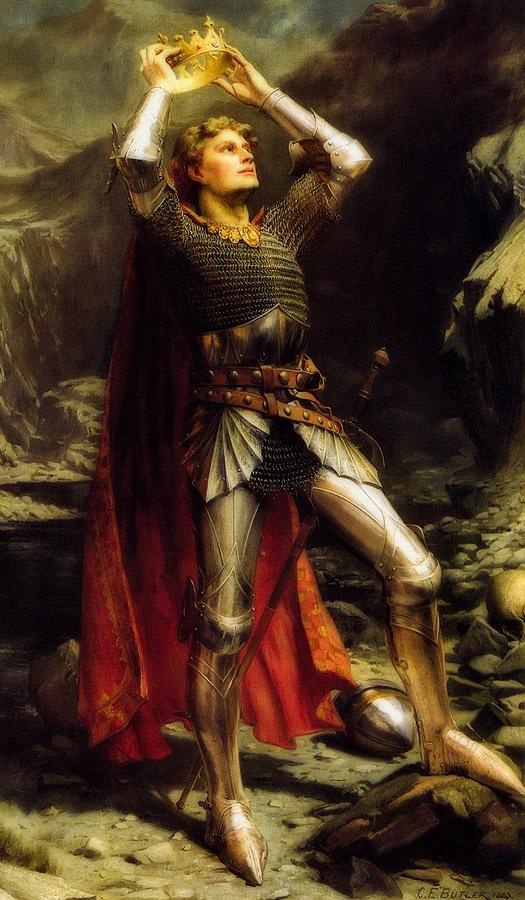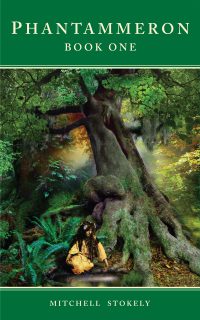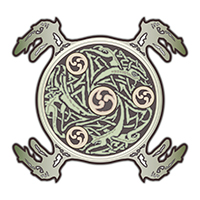One of my many hobbies the past 30 years has been the research of various mythological figures in history. The search for the Historical King Arthur is one of my favorites.
I’ve always been fascinated by the myth but also the search for this historical figure, much as the world’s historians have searched for the truth about the life of Jesus. But the truly amazing lesson learned from separating fact from fiction is that often it’s impossible. With so few writings about either men we are left with tiny fragments and hints about the real person that once lived but later inspired millions by his sad yet heroic tale. I’ve often said in my lectures that our Myths have more meaning than reality. That’s certainly been the case in molding the fate of Arthur in story. Today’s society seems lost in a morass of literary realism, new but unproven science, and a complete rejection of religion and spiritualism which combined means like Arthur in his time we live in our own intellectual Dark Ages in 2020.
But I’m convinced there’s enough archaeology and scholarship of the past, in combination with a few rare religious texts of his contemporaries, to finally unveil the true Historical Arthur! Yes I have a name!

To discover who Arthur was is fascinating because we know that such legends don’t begin purely in the imagination of Mankind. And yet it is his Myth that remains of value, not his history. The stories behind this mystical battle-lord are important because they form the epicenter of a wealth of inspiration for all kinds of writers today and have for centuries before our time.
It’s true that today in 2020 his luster has faded in the wake of an Age of Realism where religion and spirituality has died back. Many of us today, sadly, find ourselves often disbelievers of any truth that cannot be proven by the scientific method. And so spiritual wonders of the Self remain far from our grasp, like the new distrust of psychology and studies of the mind’s ancient archetypes that many see as having little value in 2020.
And yet the mind’s eye still holds, unbeknownst to us, the foundations of our own immutable darkness we refuse to behold and think we can change, as well as the fount of true empathy and goodness for the world and our fellow man that our minds alone must hold and defend against the constant pressure of our selfish wills. This isn’t a criticism but a flaw I hope new generations today will see in themselves and someday challenge. For such Myths as Arthur’s hold the keys to a vast treasure of the Self that only your imagination can provide.
In truth, all Myths instill in us the wonder of life that connects us to forces beyond our Being, like a Creator or the powers behind the Universe, if our minds are open to them. To dismiss all of Myth as but historical fabrication and illusion is a very shallow premise; one that dismiss all art, all religion, and the history of thousands of cultures and millions of years of Mankind’s evolution. Who among us is that ignorant and arrogant?
Arthur is such an archetype that might help them, if his myths could be valued again. And so I share my discoveries with you of the historical man so that those who demand realism in this desperate technological age may be placated.
The Mythological Arthur and his ancient tales represent the capacity to self-sacrifice and yet hold a cultural meaning that says great leaders can and do exist to guide us to some new place we individually cannot fathom. This Mytho-Arthur to me has always represented a Truth about the Self; that there is a “good king” in each one of us that guides us like those that love Jesus in Christianity. For we are not just “experience” or social connections. Inside of us is the making of heroes and legends. Our minds fashion the world as we desire it. And it’s truths and delusions, equally, influence millions and the making of great civilizations. Our goodness or truths inside us, and in the myths we celebrate, can reverberate through time and influence future generations through our acts or our noble words in books, if we truly believe in their forces inside us. Such has been the power of Arthur’s myths over time.
And so the stories of King Arthur has thus become a source of light for me. I see in others an Arthur that defies convention and the Modern World, a “good lord” in others that has bigger Truths to tell, of love for the world that is pure and endures. I love Arthur as a representation of a force that leads us all through suffering or loneliness, health issues, etc. Arthur reminds me of the goodness of sacrifice for others we love. Arthur is what is best in Men.
That’s why men and woman through the ages – during spiritual revolutions in western society – so often revisit the story of King Arthur and celebrate his stories. He is what’s great in Humanity. His myths celebrate victory in life but also his will to lead all men to their own Grails of Goodness. He is much more than a winner of victories or leader of men in battle. He is a paradigm of all that is good and great in Humanity. His mythologies become cultural bookmarks in history where great poets celebrate his meaning and his mystery equally, using his legend to create new odes to greatness in their own time or rebuild domains or heal societies ills. But more than all these he stands for the unsolved mystery of life that we can never know. And yet his adventures and that of his noble knights is a journey in the search for meaning of Life itself……the struggle to comprehend with great courage the mystery of why we are here.
And yet beyond the Myth of Arthur there remains a mystery about the historical man. He must have been a real man, too, one that existed to inspire his basic story of victory against the Saxon’s which historically we know took place on some level.
When I read some things about 5th century Britain I started to realize this was a person that like Jesus came from a real time and place in history. That’s when I knew I could find the real historical Arthur. And yet I knew 99% of his history would remain but a myth that remained bound to imagination alone.
So who was our Historical King Arthur?

The ancient Christian writer Gildas (6th century) is our only near-contemporary to the actual age when Arthur would have lived. In his “De Excidio et Conquestu Britanniae” we learn of the recent perils of a post-Roman Britain when chaos ensued and the Scotts and Irish had begun to invade following the retreat of Rome from the isles. In that time of turmoil some among the Briton’s invited over the warlike Saxons from Denmark and Germany. But they soon took over the eastern part of the isle, pushing West till the Britons were nearly destroyed. In this chronicle of 544 A.D. we learn of this history from Gildas alone, though of course he does not mention Arthur by name in his Latin text. But he states quite clearly the name “Ambrosius Aurelianus” as a humble man and leader of post-Roman origin who led the Briton’s in their fight against the Saxons. Several paragraphs later he then mentions the victory at Badon in which they beat the enemy. Some 50+ years of peace followed. That figure I feel is our original Arthur.
If you then follow Bede, Nennius, and then our Jeoffrey of Monmouth texts that fleshed out the mythological Arthur (the latter 600 years later) you see them building on the Mt Badon association. But Arthur is something now supernatural.
If you go back in Welsh stories following the time of Gildas you clearly see the evolution of the original Ambrosius hero over time in Welsh cultural myth after 600 AD. He slowly evolves into a legend as young bastard boy king, then later a magician, and eventually Merlin.
It’s my belief that in parallel in Brittany immigrants also carried the story of this battle-leader at Badon but that’s where the Arthur name and legend grew. I say this because there’s evidence associating Jeoffrry of Monmouth with welsh-Norman influence and ancestry. Plus much of the legends of Arthur seemed to have evolved in France and overseas before and after his History. We then end up with the Normans carrying these legends back to England and The History of the Kings, thus bringing from overseas this much richer mythology with Arthur already conceived but which layered over the original Ambrosius story in Welsh legend. Thus was Arthur born.
But the prototype came from Gildas and the historical post-Roman battle leader. That’s my theory. It would mean we have a boy (Ambrocius)in the middle of the 5th century – possibly from Londinium or Bath, an orphaned child of some defeated Roman Consul or family – that alone survived and rose up as a battle-leader. Legend says he was raised by a welsh prince which would make sense. He then became our historical Arthur who stood against a sworn enemy that destroyed his parents homeland. If that’s all the history we can gather it still is a fascinating story and shows us how from a very destructive age of defeat and decline a last heroic figure can still remain to gather forces of a broken society and turn the tides of history.
It must have been a miraculous event as we have Gildas describing it some 40 years later (~544 AD) plus two separate myths developing on two continents in parallel. We have to assume it was something fabulous and epic. But I’m not associating 99% of the Myths of Arthur with the historical figure. I would say the only truth we have of Arthur that remains is the siege at Mt Badon as that is the only historical event that’s consistent across all histories, manuscripts, myths, and legends I could find. Even the Arthur name appears to be fictional.
In the end it is my belief that Ambrosius Aurelianus is our King Arthur in history. He lived and he was remembered by Gildas just 40 years later. He was in fact the last of the great men of Rome in Britain, or rather its last prodigal child. As such this discovery lends Roman History more power, and lends greater importance to the idea that great organizing and civilizing powers in history truly hold some guiding force in the fates of great people and of cultures.
If this man, though vaguely known, is our Arthur it reveals to us a tragic yet thrilling moment in history when a great culture falls, and the barbarism hoards return. Yet, in the midst of a civilization’s decline it seems possible that culture has one last gasp of beauty and courage to show its true worth and mettle through a single leader. Yet, in the midst of a civilization’s decline it seems possible that out of that fallen culture could come one person of mobile upbringing and courage to show a nation and its people its true worth and power, one last time.
And so Arthur personified that tragic beauty to me and some last gasp of Truth. Arthur, in that sense, reminds me of America; it’s own decline and slow destruction which appears to be underway in some form today. For I see we change so much for the better and yet there is so much worth and wisdom of the past now being destroyed and discounted from the mouths and writings of older, much wiser men.
In the midst of our own modern struggles today – a death not of money or jobs or culture, but of truth and spirit – maybe we should seek that last Arthur today among our elders and preserve the beauty of words, of poets, of myths, and of religious truth from them, before it is gone. Before we enter some new digital age of artificial intelligence and mass consumerism, maybe we should look back as Arthur did and defend the walls of integrity and humility and faith and wisdom that sadly seem to crumble before us. For he was a Roman and a dying relic not suitable for the Saxon settlements flooding his country. He was a relic of an older dying culture in his own time that should have died early and been diminished. He was of olden days not a newer generation.
And yet this Arthur, Ambrosius, defied change to preserve the Britons and their dying culture which he alone gathered to defeat the Saxon invasion at some last siege of the hill of Badon. Such a victory we are told gave 50 years of peace and drew a line between two cultures on the isle, forever. Archaeology has proven that now.
Arthur does not stop change nor reorder history or culture but defends what is left that is great. He defends its older values and its last relics of wisdom for a reason. Why? Because they are valuable in preserving our meaning and purpose on this planet. To lose vast troves of knowledge and learning is the tragedy we see today.
Even if we have yet found our Arthur in the flesh today, he will live in books, in our Myths, and in our children’s hearts that yet dream of him, despite the ignorance of Modern culture today. For there will come a future generation that shall look upon all that seems great and wondrous in the monuments we build to our egos today and in the new Digital Age and see in its half-hearted attempts for societal oneness, it’s cold science, and its new authoritarian voice nothing of real beauty or meaning to them. It’s likely they, like their forefathers, brutally tear it down seeking the spiritual truths of the Self and it’s rich Mythology again which we bury today like graves in our souls.
Such is the cycle of history now every 50 years in this country. For every new creation that rewrites history is itself destroyed and it’s own history denied and rewritten. For the cycle of cultural revolution is we must rebel against previous ideals and expose their lies.
And yet Arthur’s story continues through Time, living past life itself, his story continually retold, as the petty lives of us all fade from history? Why? I ask you to ponder that…
In that future time, if my words still remain on a dusty shelf, it’s my hope those who desire to explore the depths of their mythological selves and their ancestors will seek once again the power and meaning in the lost story of Arthur and of Ambrosius in old history books, the myth and the historical man and remember.
Having regained the capacity to separate and yet merge the two part of Arthur and see their full meaning once more, the power and purpose of the Legend of King Arthur will rise again as he has arisen in me in future generations, I feel. And they alone will know his meaning and renew in a future time and works his legend again.
– the Author, June 2020



